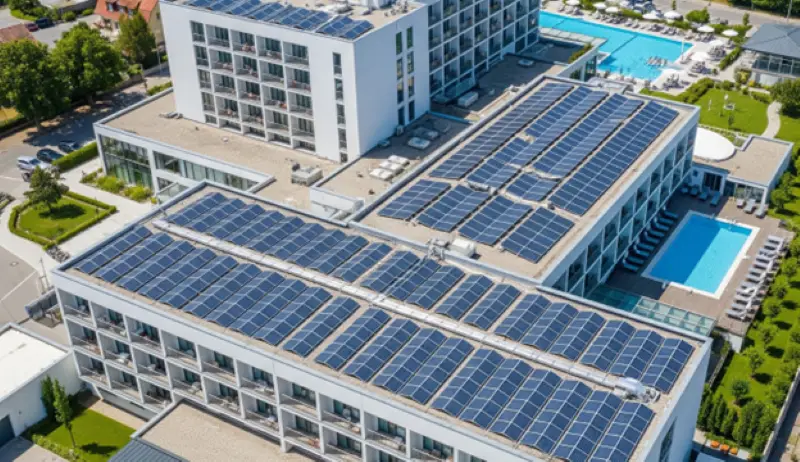Click here to get this post in PDF
As UK businesses grapple with rising energy costs and increasing pressure to meet sustainability goals, commercial solar panels have emerged as an attractive solution. They promise reduced electricity bills, long-term energy security, and improved green credentials, but are they really worth the investment?
For many business owners, the decision comes down to balancing upfront costs against long-term financial and environmental benefits. Let’s explore whether commercial solar panels are the right choice for your company.
Rising Energy Costs: A Challenge for UK Businesses
Over the past few years, commercial energy prices have soared. Many companies now face electricity bills that are double or even triple what they were just a few years ago. This has squeezed profit margins, particularly for energy-intensive sectors like manufacturing, hospitality, and retail.
Installing solar panels offers a way to take control of energy costs by generating your own electricity directly from sunlight. Unlike traditional energy prices, which are subject to market volatility, the sun is a free and reliable source of energy.
The Financial Case for Commercial Solar Panels
Lower Operating Costs
The biggest appeal of solar power for businesses is the opportunity to cut electricity bills. A well-designed commercial solar system can reduce reliance on the grid by 40–70%, depending on energy usage patterns.
For example:
- A medium-sized office building with a 50kW solar system could save £10,000–£15,000 annually.
- Larger industrial sites with 250kW+ systems may save £50,000 or more each year.
Return on Investment (ROI)
While the initial investment can be significant, commercial solar panels typically pay for themselves within 5–8 years, after which savings are effectively profit. Given that solar panels last 25 years or more, businesses can enjoy decades of reduced overheads.
Exporting Excess Power
Through the Smart Export Guarantee (SEG), businesses can earn payments for surplus electricity exported to the grid. This adds an extra revenue stream that enhances ROI.
Upfront Investment: Understanding the Costs
Naturally, one of the first questions business owners ask is about the cost of installation. The cost of solar panels in the UK varies depending on system size, technology, and whether battery storage is included.
Approximate costs:
- 50kW system: £50,000–£65,000
- 100kW system: £90,000–£120,000
- 250kW+ system: £200,000+
While these figures may seem daunting, it’s important to remember that solar installations should be viewed as long-term capital investments, not short-term expenses. With financing options, grants, and tax benefits available, many businesses find the real cost to be more manageable than expected.
Environmental Benefits: Meeting Sustainability Goals
Beyond financial returns, solar panels deliver significant environmental value:
- A 100kW system can offset around 40 tonnes of CO₂ annually.
- This reduction supports corporate social responsibility (CSR) commitments and demonstrates leadership in sustainability.
- Many clients and customers now actively seek businesses with strong environmental credentials, giving solar adopters a competitive edge.
For companies aiming to meet net-zero carbon targets, solar is one of the most direct and effective steps they can take.
Additional Business Advantages
Energy Independence
- Solar panels reduce reliance on grid electricity, protecting businesses from energy price volatility.
Brand Reputation
- Installing solar showcases a commitment to sustainability, appealing to eco-conscious customers and partners.
Property Value
- Commercial properties equipped with renewable energy systems often command higher values and attract long-term tenants.
Government Incentives
- With VAT on solar at 0% for domestic properties and attractive tax benefits for commercial sites, there are clear financial advantages for early adopters.
Are There Downsides?
While the benefits are substantial, businesses should also consider potential drawbacks:
- High Initial Costs: Although ROI is strong, upfront investment can be a barrier without financing.
- Space Requirements: Rooftop or ground space is needed to install large systems.
- Energy Usage Patterns: Businesses that primarily use power at night may benefit less unless battery storage is added.
- Maintenance Needs: While minimal, systems require occasional cleaning and monitoring.
Despite these factors, most businesses find that the advantages far outweigh the drawbacks, particularly when the installation is designed around their specific needs.
Commercial Solar + Battery Storage
Pairing solar panels with commercial battery systems maximises the value of an installation. Batteries allow businesses to:
- Store surplus energy for use during peak demand times.
- Reduce reliance on expensive evening electricity.
- Protect operations from grid outages.
Although batteries add to the initial cost, they significantly increase the percentage of on-site energy usage, further strengthening ROI.
Who Benefits the Most?
Commercial solar panels are particularly beneficial for:
- Warehouses and Factories: Large roof space and daytime energy use maximise savings.
- Retail and Office Spaces: Reduced bills and improved sustainability credentials boost competitiveness.
- Schools and Public Buildings: Lower energy costs free up budget for other essential needs.
- Hospitality Businesses: Hotels and restaurants can offset high electricity usage.
The Bottom Line
For most businesses, the answer is yes. Commercial solar panels offer:
- Immediate and long-term savings on energy bills.
- A typical ROI period of under a decade.
- Strong environmental and branding benefits.
- Energy independence in an uncertain market.
When viewed not as a cost but as an investment in the future, solar panels are one of the most financially and strategically sound decisions a business can make.
Final Thoughts
As energy prices continue to fluctuate and pressure mounts for businesses to demonstrate sustainable practices, solar panels stand out as a practical, cost-effective solution. They reduce bills, improve environmental impact, and enhance corporate reputation.
By understanding the cost of solar panels and weighing it against long-term savings and ROI, business owners can make informed decisions that will benefit their bottom line for decades.
For UK companies serious about cutting costs and leading the way in sustainability, investing in commercial solar panels isn’t just worth it, it’s essential.
Also read: How Solar Panels Can Improve Business Resilience to Energy Price Hikes
Image source: AI-generated with Google Gemini

